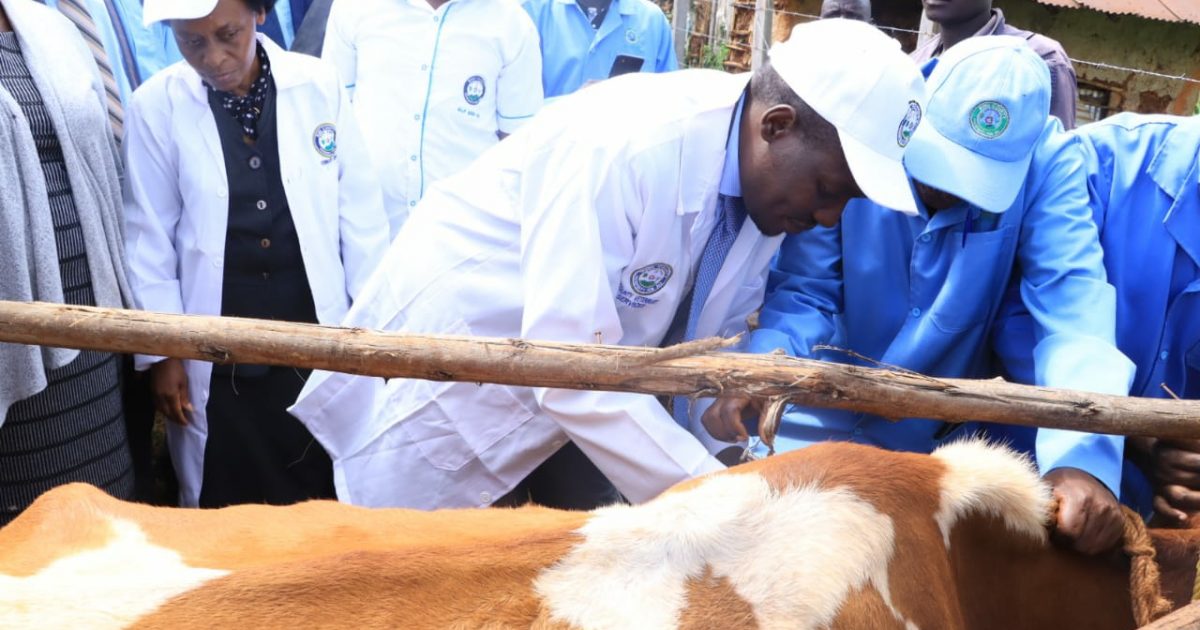
We’ll use locally-manufactured vaccines for livestock vaccination – Agriculture CS
The government has reassured Kenyans that the vaccines to be used in the upcoming nationwide livestock vaccination campaign are locally produced by the Kenya Veterinary Vaccines Production Institute (KEVEVAPI).
Agriculture and Livestock Development Cabinet Secretary Dr. Andrew Karanja dispelled concerns regarding the procurement of vaccines from abroad, stating that KEVEVAPI has been successfully producing and exporting livestock vaccines to over a dozen African countries, including Uganda, as well as to the United Arab Emirates (UAE).
“These vaccines have been tried and tested and have been in use in the country for other vaccinations, which is a testament of their safety,” said Dr. Karanja.
The Cabinet Secretary disclosed that Uganda has ordered three million doses of the same vaccines for its livestock.


According to Dr. Karanja, the government intends to vaccinate approximately 22 million cattle and 50 million sheep and goats starting in January 2025. He emphasized that the vaccination exercise will be free of charge, with the government covering all costs.
Dr. Karanja underscored the necessity for a unified approach to managing livestock diseases, particularly Foot and Mouth Disease in cattle and Peste des Petits Ruminants (PPR) in sheep and goats.
“In the past, individual counties have been vaccinating their livestock only during outbreaks, often leaving surrounding counties unprotected. This has proven ineffective due to the considerable movement of livestock across counties, making it a waste of resources when not all counties participate,” he explained.
He noted that a coordinated effort is essential to eradicate these diseases in order to facilitate Kenya’s ability to trade livestock in international markets, such as the European Union (EU).
Dr. Karanja assured farmers and the public that there is no ulterior motive behind the vaccination exercise, emphasizing the need to protect livestock from disease and ensure safe animal products for consumption.
“Concerns have been raised regarding the vaccination initiative, and we will engage stakeholders to clarify specific areas, ensuring we are all aligned,” stated the CS.
KEVEVAPI Managing Director (MD) Alex Sabuni confirmed their capacity to produce the 22 million doses needed for the nationwide vaccination effort.
Sabuni further explained that the country has been manufacturing the Foot and Mouth Disease vaccine, used for cattle, sheep, goats, and pigs, at their Industrial Area facility since 1964, while the Kabete plant produces an additional 12 vaccines.
“We have research land in Limuru where we keep our research animals,” explained Sabuni, noting that they supply vaccines to various African countries, including Uganda, Mali, Senegal, and the UAE.
He revealed that they are currently producing vaccines for a nationwide vaccination campaign and are awaiting a programme from theDirector of Veterinary Services (DVS) regarding their supply.
“Vaccine production is particularly interesting because the less you produce, the more expensive it becomes. Now that we will be producing them in bulk, costs are likely to decrease,” Sabuni elaborated.
He mentioned that they are currently selling a dose of the Foot and Mouth vaccine for Ksh105 locally and US$1.20 internationally.
On his part, Dr. Allan Azegele, the Director of Veterinary Services (DVS), stated that they will employ a risk-based approach in the vaccination campaign, highlighting the devastating effects of Foot and Mouth disease on dairy animals. Consequently, the initial focus will be on counties that are predominantly dairy producers.
Dr. Azegele stated that the ultimate goal is to achieve recognition of freedom from Foot and Mouth disease.
“The Foot and Mouth vaccination will occur twice a year because the current vaccine provides immunity for about six months,” he noted.
According to Dr. Azegele, if Kenya can successfully execute vaccinations twice a year for three years, it will be possible to seek freedom from the recognized by the World Organization for Animal Health (WOAH), Kenya will have increased access to international markets, as it can demonstrate that its herds are free of the disease and focus on monitoring any outbreaks.
“With Peste des petits ruminants (PPR), we are committed to eradicating the disease because one vaccination is sufficient for a lifetime. This enables us to act swiftly, and within two years, we can achieve freedom from this disease, allowing our sheep and goats to access international markets,” Dr. Azegele said
